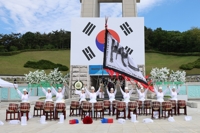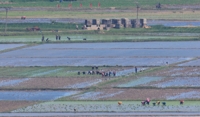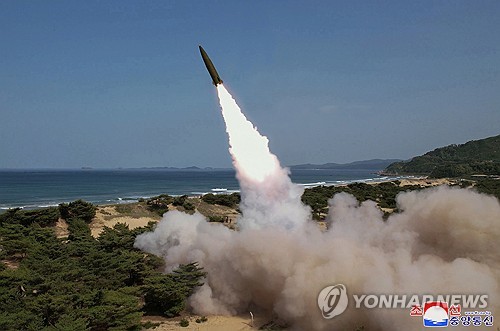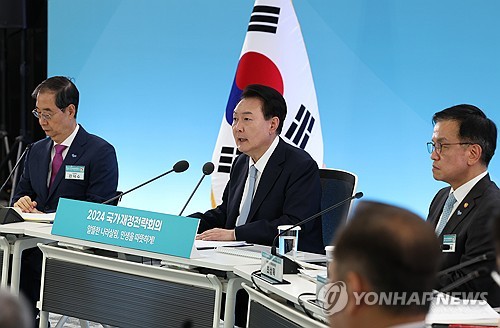(LEAD) S. Korea, U.S., Japan conduct 1st joint air exercise near Korean Peninsula
(ATTN: CHANGES headline, lead; UPDATES throughout with latest details)
SEOUL, Oct. 22 (Yonhap) -- South Korea, the United States and Japan staged a joint air exercise for the first time near the Korean Peninsula on Sunday, Seoul's Air Force said, amid trilateral efforts to bolster security cooperation against North Korean threats.
The three-way exercise took place south of the peninsula, where South Korean and Japanese air defense identification zones overlap, involving a U.S. B-52H strategic bomber, as well as South Korean, U.S. and Japanese fighter jets, according to the armed service.
While the U.S. Air Force has conducted separate bilateral drills with its South Korean and Japanese counterparts around the peninsula, it marked the first time for the three countries to stage joint air drills in the area.
"This exercise was designed to follow through on the defense agreements discussed in the Camp David summit in August and expand the three countries' response capabilities against North Korea's advancing nuclear and missile threats," Seoul's Air Force said.
It said the exercise demonstrated the solidarity between the three countries, noting that it plans to further enhance trilateral cooperation based on the "solid" South Korea-U.S. alliance.

This photo provided by South Korea's Air Force shows a U.S. B-52 strategic bomber taking part in a combined air exercise with South Korean F-35A fighter jets over the Korean Peninsula on Oct. 17, 2023. (PHOTO NOT FOR SALE) (Yonhap)
The latest exercise came after President Yoon Suk Yeol, U.S. President Joe Biden and Japanese Prime Minister Fumio Kishida agreed to strengthen security cooperation and hold "annual, named, multi-domain trilateral" exercises on a regular basis during their Camp David summit in August.
Earlier this month, Seoul, Washington and Tokyo staged a trilateral maritime interdiction exercise in waters south of the Korean Peninsula for the first time in seven years.
North Korea has reacted angrily against the ongoing three-way cooperation, with its leader Kim Jong-un labeling it as the "worst actual threat" last month as the country amended its constitution to enshrine its nuclear-force building policy.
Last Tuesday, the U.S. B-52H nuclear-capable bomber made its first known landing at a South Korean airbase after staging joint air drills with South Korean fighters and flying over a biennial arms exhibition just south of Seoul.
The deployment of the long-range heavy bomber came after the U.S. pledged to enhance the "regular visibility" of strategic assets on the peninsula in a joint declaration issued by Yoon and Biden during their summit in Washington in April.
yunhwanchae@yna.co.kr
(END)
-
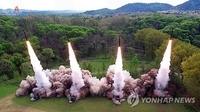 N. Korea fires unspecified ballistic missile toward East Sea: JCS
N. Korea fires unspecified ballistic missile toward East Sea: JCS -
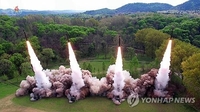 (2nd LD) N. Korea fires short-range ballistic missiles toward East Sea: JCS
(2nd LD) N. Korea fires short-range ballistic missiles toward East Sea: JCS -
 (URGENT) N. Korea fires ballistic missile toward East Sea: S. Korean military
(URGENT) N. Korea fires ballistic missile toward East Sea: S. Korean military -
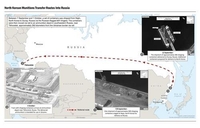 U.S. sanctions 5 Russia-based individuals, entities linked to arms transfers between N. Korea, Russia
U.S. sanctions 5 Russia-based individuals, entities linked to arms transfers between N. Korea, Russia -
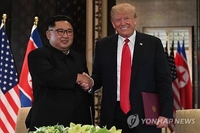 (LEAD) Trump may like to 'solve' N. Korean nuclear problem if reelected: ex-official
(LEAD) Trump may like to 'solve' N. Korean nuclear problem if reelected: ex-official
-
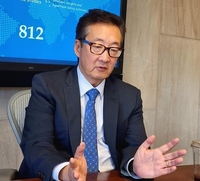 Only 34 pct of S. Korean elites favor nuclearization: CSIS poll
Only 34 pct of S. Korean elites favor nuclearization: CSIS poll -
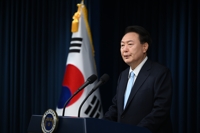 Yoon's approval rating falls for 3 weeks straight to 30.2 pct
Yoon's approval rating falls for 3 weeks straight to 30.2 pct -
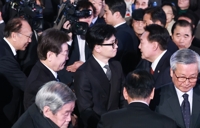 Disagreement over ambassador, presidential aide opens up fresh rift between Yoon, PPP leader
Disagreement over ambassador, presidential aide opens up fresh rift between Yoon, PPP leader -
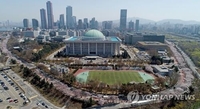 Political parties ramp up campaign efforts amid shifting opinion polls
Political parties ramp up campaign efforts amid shifting opinion polls -
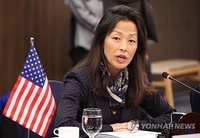 (News Focus) U.S. focus on 'interim' steps with N. Korea raises questions about policy direction
(News Focus) U.S. focus on 'interim' steps with N. Korea raises questions about policy direction








